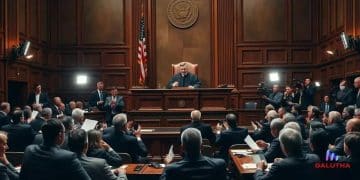Trump administration legal challenges: What you need to know
The Trump administration faced numerous legal challenges, including high-profile investigations and impeachment trials, which significantly influenced public opinion, political dynamics, and future legal precedents in American governance.
Trump administration legal challenges have become a focal point for understanding recent political dynamics. From investigations to impeachment trials, these legal battles shape public discourse and policy. Have you followed the twists and turns of these significant events?
Legal battles during the Trump administration
The key legal battles during the Trump administration significantly shaped American politics and policy. These challenges reflect the intense scrutiny and divisiveness characterizing political life during this era. Understanding these battles is crucial for grasping the broader implications on governance.
Major Cases
Throughout the Trump presidency, several high-profile legal cases attracted national attention. Each case brought forth unique implications for both the administration and the public.
- Impeachment trials raised questions about executive power.
- Investigation into Russian interference highlighted issues of electoral integrity.
- Various lawsuits regarding immigration policies tested legal limits.
Moreover, various federal court decisions influenced policy directions. Each ruling from the courts became a pivotal point in shaping the future of policies like healthcare, immigration, and more.
Public and Political Reactions
Public reactions to these legal battles were often polarized. Supporters viewed them as necessary checks on the executive branch, while opponents saw them as partisan attacks. The media coverage examined every twist, fostering a culture of intense debate.
Amidst such scrutiny, legal challenges brought many citizens’ voices to the forefront of public discourse. Many individuals engaged via protests or public commentary about decisions affecting their lives.
Impacts on Governance
These legal battles did not merely serve as background noise; they had real consequences on governance. The significant number of court rulings often delayed or altered policy implementation. It shifted the administration’s priorities as legal opinions continually emerged.
In essence, the ongoing legal challenges during the Trump administration shaped not just his presidency but the American political landscape. As these issues developed, they would spark conversations about future governance and accountability.
Impact of court rulings on policy changes
The impact of court rulings on policy changes during the Trump administration has been profound. Each ruling not only affected specific policies but also reverberated through the political landscape, influencing public opinion and legislative actions.
Significant Rulings
Several court decisions became landmarks in legal history, altering key policies. These rulings have highlighted the judiciary’s role in checking executive power.
- The Deferred Action for Childhood Arrivals (DACA) ruling protected many immigrants.
- Decisions on the travel ban contradicted the administration’s immigration policy.
- Supreme Court rulings impacted healthcare access for millions.
As these decisions unfolded, they affected not just immediate policies but also set precedents for future legal interpretations. The ramifications of these legal outcomes have initiated conversations about rights and justice in America.
Policy Reactions
In response to key legal battles, policy adjustments were often necessary. The Trump administration found itself revising many strategies to comply with judicial mandates. While some changes led to public praise, others stirred significant controversy.
For instance, after losing legal challenges on immigration, the administration sought new methods to enforce policies while still adhering to court orders. This tension created a dynamic and unpredictable political environment.
Long-Term Effects
The long-term effects of these court rulings are yet to be fully understood. They have initiated a broader conversation about the role of the judiciary in American society and governance. Public trust in the judicial system has also been influenced by how these rulings were perceived by different political factions.
Ultimately, as we reflect on the impact of court rulings, it’s clear that the intertwining of law and policy will shape future administrations. The influence of these judicial decisions continues to echo in current debates in American politics.
Major investigations and their outcomes
During the Trump administration, major investigations played a crucial role in shaping the political landscape. These investigations examined various aspects of his presidency, leading to significant outcomes that impacted governance and public trust.
The Russia Investigation
One of the most prominent investigations was the inquiry into Russian interference in the 2016 election. This probe sought to determine whether there was collusion between the Trump campaign and Russian officials.
- The investigation produced a detailed report outlining multiple contacts between campaign members and Russian operatives.
- While it did not establish a conspiracy, it led to several indictments and guilty pleas from Trump associates.
- This investigation deepened divisions within the electorate and heightened scrutiny of election integrity.
This environment of scrutiny brought renewed attention to election laws and foreign influence on American democracy.
Impeachment Investigations
The Trump administration also faced impeachment inquiries, notably in 2019 and 2021. These inquiries examined allegations of abuse of power and obstruction of justice.
The first impeachment was triggered by a phone call with Ukraine’s president. Allegations suggested that Trump solicited foreign interference to benefit his re-election campaign. The outcomes of these inquiries led to:
- Historic impeachment by the House of Representatives.
- A subsequent trial in the Senate that ultimately acquitted him.
Public opinion shifted significantly during this period, with many citizens closely following the developments. The impeachment trials prompted discussions about accountability and presidential power.
Financial Investigations
In addition to political inquiries, financial investigations scrutinized Trump’s business practices. These investigations focused on allegations of tax fraud, banking malpractice, and the handling of foreign investments.
Potential outcomes of these investigations remain uncertain. However, they have raised questions about transparency and ethical governance in public office.
Overall, the major investigations into the Trump administration highlighted critical issues related to legality and ethics in the highest levels of government. These inquiries have left a lasting mark on American political life.
Public and political reactions to legal challenges

The public and political reactions to legal challenges during the Trump administration were intensely polarized. As legal battles unfolded, they sparked varied responses from different segments of society.
Public Sentiment
Many citizens closely followed these legal issues, which influenced public opinion significantly. Opinions were often divided along party lines, with supporters generally defending the administration and its actions.
- Proponents of Trump viewed the investigations as politically motivated attacks.
- Opponents saw these challenges as necessary to uphold the rule of law.
- The media played a key role in shaping narratives and public discourse around these events.
This media coverage highlighted the split in American society, drawing attention to broader issues of trust in institutions.
Political Reactions
Political leaders reacted strongly to the unfolding events. Many Republican lawmakers defended the administration, while Democrats called for accountability and reform. This environment led to heightened rhetoric and a charged political atmosphere.
As investigations progressed, some politicians took specific actions:
- Calls for impeachment were met with fierce debate and division.
- Congressional hearings became platforms for both sides to articulate their views.
- Legislators introduced bills seeking to restore faith in electoral processes and judicial systems.
These actions underlined the importance of legal challenges in shaping political agendas and strategies.
Social Movements
In addition to public opinion and political responses, social movements emerged as a result of these legal challenges. Activists mobilized around specific issues, advocating for justice and reform.
Many protests and rallies called for action against perceived injustices, bringing together diverse groups across the country. These movements highlighted the power of grassroots activism in the face of political and legal conflicts.
The public and political reactions to these challenges illustrate the significant impact of legal battles on American society. They reveal how these issues can shape conversations on justice, governance, and civic responsibility.
Future implications of ongoing legal issues
The future implications of ongoing legal issues in the wake of the Trump administration are far-reaching. These legal battles continue to influence political discourse and governance in the United States.
Legal Precedents
As new rulings emerge from ongoing cases, they can set important legal precedents. These precedents will not only affect policies related to the Trump administration but will also have lasting effects on future administrations.
- Key rulings on executive power may reshape how future presidents navigate legal boundaries.
- Judicial interpretations regarding election integrity could redefine campaign practices.
- Decisions concerning immigration policies will influence how similar cases are handled in the future.
These developing legal norms are critical as they impact public expectations and governmental responsibilities.
Political Repercussions
The unfolding legal issues also carry significant political implications. They could alter party dynamics and influence upcoming elections.
As legal challenges continue, we see increased mobilization among various voter groups. Potential outcomes may include:
- Strengthened advocacy for changes in legal frameworks and governance.
- Shifts in party strategies based on public response to ongoing investigations.
- A heightened focus on accountability and transparency from elected officials.
These repercussions may well shape the electoral landscape, potentially altering control of Congress and state legislatures.
Evolving Public Perception
As citizens witness the outcomes of these legal challenges, public perception is bound to evolve. The ongoing debate surrounding the legality of certain actions may influence how individuals view the justice system and their government. Community engagement is likely to grow as people seek to understand these complex issues.
Overall, the future implications of ongoing legal issues will continue to unfold, impacting governance, the political arena, and public attitudes long after these cases conclude. The outcomes will serve as a critical touchstone for discussions about democracy and the rule of law in America.
FAQ – Frequently Asked Questions about Legal Challenges in the Trump Administration
What were the key legal battles during the Trump administration?
Key legal battles included investigations into Russian interference, impeachment trials, and numerous lawsuits regarding immigration policies.
How did public opinion react to the ongoing legal issues?
Public opinion was divided, with supporters seeing the challenges as partisan attacks and opponents viewing them as essential checks on power.
What are the future implications of these legal challenges?
The future implications include potential changes to legal precedents, shifts in party dynamics, and evolving public perceptions of the justice system.
How have grassroots movements influenced the legal discourse?
Grassroots movements have mobilized citizens to advocate for justice and reform, increasing public engagement on legal and political issues.





